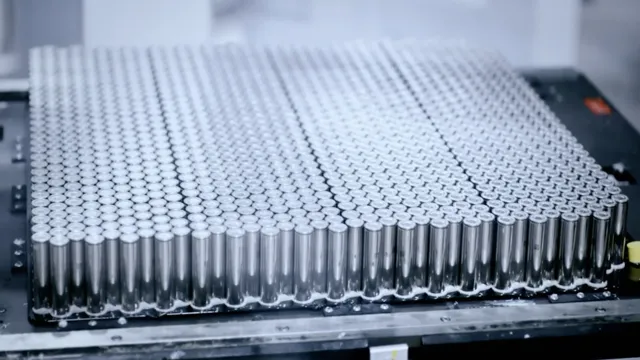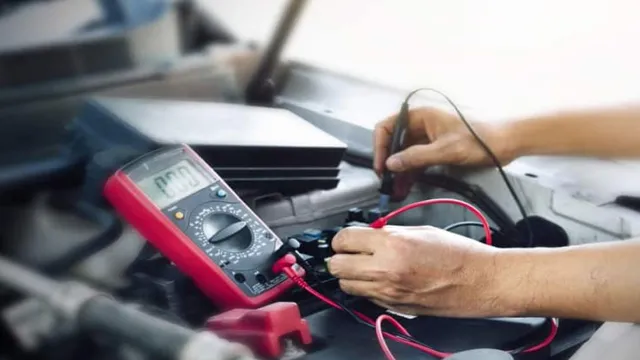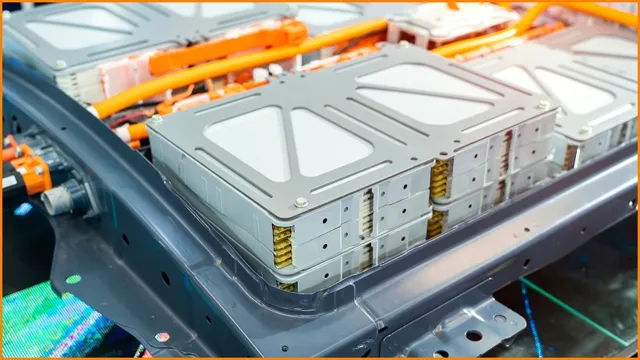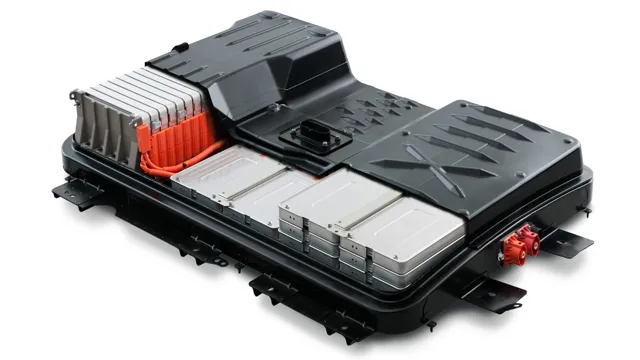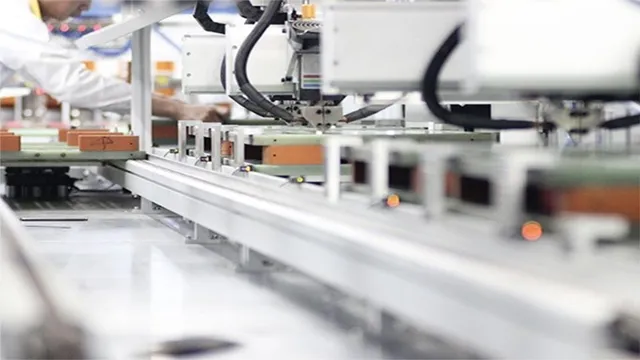Revolutionizing Electric Cars: The Power of Battery Storage Cells
Electric vehicles are rapidly gaining popularity, thanks to their eco-friendliness and cost-effectiveness. However, as with any technology, there are still some concerns that need addressing. One of these concerns is battery life, particularly how long a vehicle can go on a single charge.
This is where battery storage cells come in. These specialized cells play a vital role in the performance of electric vehicles, allowing for extended driving ranges and improved efficiency. The power of battery storage cells cannot be overstated, as they offer a variety of benefits that traditional fossil fuel-powered vehicles simply cannot match.
For instance, electric cars can be charged at home, eliminating the need for regular trips to gas stations. Additionally, the use of renewable energy sources to power these vehicles means that they are much more environmentally friendly than traditional cars. Battery storage cells also have the added advantage of being able to handle regenerative braking, where the car’s kinetic energy is converted into electrical energy and stored in the battery for future use.
This not only improves the efficiency of the vehicle but also reduces brake wear and tear. As technology continues to advance, battery storage cells are becoming increasingly sophisticated, allowing for longer driving ranges and shorter charging times. This means that electric vehicles are becoming a more viable option for people who need to travel longer distances.
In conclusion, the power of battery storage cells cannot be ignored when it comes to electric vehicles. They are a critical component that enables these cars to offer longer driving ranges and increased efficiency. With the technology continuing to advance, electric vehicles are quickly becoming the future of transportation.
What Are Battery Storage Cells?
Battery storage cells are essential components of electric cars, providing the energy needed to power the vehicle. These small, rechargeable devices act as the “fuel tank” for electric cars, storing energy produced by the car’s charging system so that it can be used later on. They come in various shapes and sizes, with different capacities and voltages depending on the car’s range and power requirements.
Battery storage cells are made up of multiple cells, each containing a positive and negative electrode, a separator, and an electrolyte that allows for the flow of electrons. The batteries used in electric cars are usually lithium-ion batteries, which are lightweight and have high energy density, making them well-suited for use in vehicles. Superior battery technology is one of the main reasons why electric cars are becoming more popular, with new innovations in battery design making it possible to achieve longer ranges and shorter charging times.
Definition and Components
Battery storage cells are the backbone of energy storage systems. They are compact and rechargeable devices that store electrical energy in the form of chemical energy. A single battery cell consists of three main components: the anode, cathode, and electrolyte.
The anode, which is typically made of lithium, is the negative electrode that releases electrons during discharge. The cathode, on the other hand, is the positive electrode that accepts electrons during discharge. Meanwhile, the electrolyte is the liquid or gel substance between the anode and cathode that carries the charged particles and provides a medium for chemical reactions.
When a battery is charged, chemical reactions occur that cause a flow of electrons from the cathode to the anode, thereby storing energy. These electrons are then released during discharge, flowing from the anode to the cathode to power an electrical device or system. Overall, battery storage cells play a critical role in the ongoing development of renewable energy systems and the transition to a more sustainable future.
Types of Battery Storage Cells for Electric Cars
When it comes to electric cars, battery storage cells are a crucial component that ensures the vehicle’s longevity and reliability. These cells store the energy produced by the car’s electric motor and power all of the car’s functions, from the headlights to the stereo system. Different types of battery storage cells are available for electric cars.
Lithium-ion batteries are the most common, thanks to their high energy density, reliability, and long lifespan. Solid-state batteries are another option gaining traction as a potential alternative to traditional lithium-ion batteries. They offer greater energy efficiency and safety than alternatives, making them an increasingly popular choice for electric car manufacturers.
Other types of battery storage cells include Nickel-Metal Hydride batteries, which have lower energy density but a longer lifespan, and Lead-Acid batteries, which are best suited for cheaper electric cars with smaller electric motors. Ultimately, the type of battery storage cell used depends on the electric car’s requirements, such as its size, performance, and cost.
Benefits of Battery Storage Cells for Electric Cars
Battery storage cells are crucial components of electric cars since they provide a reliable source of power to run the vehicle. With advancements in technology, electric car manufacturers are now using more efficient and powerful battery storage cells, which offer numerous benefits. One such benefit is increased range, enabling electric car drivers to cover more distance on a single charge.
Additionally, battery storage cells enhance performance by providing more power, allowing electric cars to accelerate faster and handle better. Battery storage cells are also eco-friendly as they reduce emissions, offering a sustainable means of transportation. Another advantage of using battery storage cells is the minimal maintenance required, which translates to reduced operating costs for electric car owners.
With battery storage cells, electric cars have surpassed conventional gas cars in terms of efficiency, performance, and overall driving experience.
Increased Range and Driving Efficiency
One of the most significant benefits of battery storage cells for electric cars is the increased range and driving efficiency they provide. With advanced battery technology, electric vehicles are now able to drive longer distances on a single charge. This means less time spent charging and more time on the road.
Moreover, battery storage cells not only increase the range of electric cars but also improve their driving efficiency. They store energy more efficiently than traditional fuel tanks, which means less energy is wasted during the charging process. As a result, electric cars with battery storage cells are more environmentally friendly and cost-effective to operate.
With these benefits, it’s no wonder why many automakers are investing heavily in battery technology for their electric vehicles.
Reduced Emissions and Environmental Impact
Battery storage cells have been revolutionizing the electric car industry, as they provide a whole host of benefits ranging from increased energy efficiency to reduced carbon emissions. One of the biggest advantages of using battery storage cells in electric cars is that they greatly reduce the environmental impact of driving. Unlike traditional gas-powered vehicles, electric cars don’t emit harmful pollutants that contribute to climate change and air pollution.
By utilizing clean, renewable energy sources and energy-efficient technology, electric cars with battery storage cells are helping to create a much greener and more sustainable transportation system. Additionally, battery storage cells can actually help to stabilize the energy grid by providing power during peak demand times and helping to prevent blackouts. Overall, the benefits of battery storage cells for electric cars are clear: they not only reduce emissions and help to protect the environment, but they also provide a more reliable and efficient way to power our vehicles.
Lower Maintenance and Operating Costs
Electric cars are becoming increasingly popular due to their eco-friendly nature and lower operating costs. One of the key features of these vehicles is the battery storage cell which powers the electric motor. These battery cells offer numerous benefits to car owners, including reduced maintenance and operating costs.
Unlike traditional combustion engines, electric cars do not require oil changes, air filter replacements, or spark plug maintenance. In addition, the regenerative braking system in electric cars helps to extend the life of the brake pads, reducing the need for frequent replacements. Moreover, with efficient battery storage cells, electric cars have lower operating costs compared to gas-powered cars.
Owners can charge their cars at home, resulting in lower fuel costs and fewer trips to the gas station. Additionally, with the advancements in technology, battery storage cells are becoming cheaper and more efficient, making electric cars a more affordable option than ever before.
Future of Battery Storage Cells for Electric Cars
Battery storage technology for electric cars is advancing rapidly, with manufacturers investing heavily in research to improve the performance and efficiency of these essential components. The goal is to create batteries that can hold more power, charge faster, and last longer, allowing vehicles to travel further on a single charge. We are currently seeing next-generation batteries that use novel materials, such as solid-state electrolytes, which offer higher energy density and lower risk of fires.
Furthermore, advancements in artificial intelligence and machine learning are enabling better battery management systems, which are critical for ensuring optimal performance and longevity. As battery technology continues to evolve and improve, the future looks bright for electric vehicles, offering an eco-friendly, sustainable solution for our transportation needs.
Advancements in Technology and Innovation
The future of battery storage cells for electric cars is looking bright thanks to advancements in technology and innovation. With increasingly powerful and efficient electric motors, electric cars are becoming more popular among consumers. However, the limitations of the current battery technology mean that they can only travel short distances before needing to be recharged.
This is where the newest generation of battery technology comes in, using advanced materials and design to improve the energy density and performance of batteries. These new batteries promise to be smaller, lighter, and last longer, making them a game-changer for the electric car industry. As manufacturers continue to invest in research and development, we can look forward to a future where electric cars are not just affordable but also practical, efficient, and environmentally friendly.
Impact on the Automotive Industry
The future is bright for battery storage cells in electric cars and the impact on the automotive industry will be huge. As we shift towards cleaner and more sustainable energy sources, electric vehicles are becoming increasingly popular. However, the technology behind batteries is still evolving, and the industry is constantly trying to improve the efficiency and performance of battery systems.
Lithium-ion batteries have come a long way in recent years, but they are not without their limitations. Therefore, researchers are developing new types of batteries to address these challenges. One exciting technology is solid-state batteries, which offer higher energy density, longer life, and faster charging times.
Another promising development is the use of sodium-ion batteries, which are cheaper and less environmentally damaging than their lithium-ion counterparts. As electric vehicles become more affordable and widely available, breakthroughs in battery technology will drive even greater growth in the market. The future of electric cars powered by innovative battery storage cells is looking bright indeed.
Conclusion: The Promise of Battery Storage Cells for Electric Cars
In conclusion, battery storage cells are the heart and soul of electric cars. They are the powerhouses that enable vehicles to run smoothly and efficiently without the need for fossil fuels. With the growing concern for climate change and the need for sustainable transportation, battery storage cells have become more crucial than ever before.
They are a game-changer in the automobile industry and have paved the way for a greener and brighter future. So the next time you see an electric car, remember that battery storage cells are the unsung heroes that make it all possible. It’s electric!”
FAQs
What are battery storage cells used for in electric cars?
Battery storage cells are integral components of electric cars, used to store and provide power to the electric motor.
What is the lifespan of a battery storage cell in an electric car?
The lifespan of a battery storage cell in an electric car can vary depending on a number of factors, including usage patterns and temperature. However, most battery cells in electric cars are designed to last between 8 and 10 years.
Can battery storage cells be recycled from electric cars?
Yes, battery storage cells from electric cars can be recycled and reused. In fact, many electric car manufacturers are now offering recycling programs for their batteries to reduce waste and promote sustainability.
What is the cost of replacing a battery storage cell in an electric car?
The cost of replacing a battery storage cell in an electric car can vary depending on a number of factors, including the make and model of the car and the type and number of cells needed. Generally, battery replacements can cost anywhere from a few thousand to tens of thousands of dollars.
